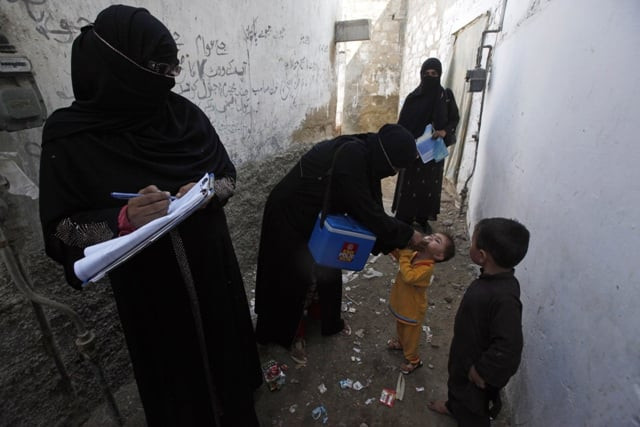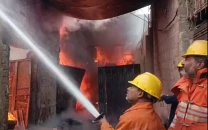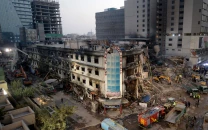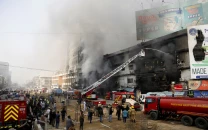For peaceful workplace: Report identifies ways to improve safety for medical staff
ICRC launches research report on violence faced by healthcare professionals

A file photo of health workers administrating polio vaccine to children. PHOTO: REUTERS
The International Committee of Red Cross (ICRC) organised a conference and launched a research report on the violence faced by healthcare professionals, with aims to identify ways to improve the safety of professionals and patients.
The report was launched in collaboration with the Association of Pakistani Physicians of North America (Appna), Jinnah Postgraduate Medical Centre and Ziauddin University.
Violence against healthcare professionals, especially in Karachi, has been increasing since the past few years. The report discusses the injustice being done against medical staff and how they are subjected to violence. Addressing the conference, health minister Jam Mahtab Hussain Dahar said, "The report will guide us in developing effective policies to protect the medical staff from violence." The minister added that it has been a year since he took charge of the health department and his main focus was on controlling its affairs.
Preparations: Public hospitals to remain on high alert
"Almost two-third of the participants of the research had experienced some kind of violence in the past year and one-third have been attacked either verbally or physically," said APPNA dean Dr Lubna Baig.
Speaking to The Express Tribune, Karachi commissioner Shoaib Ahmad Siddiqui expressed his concerns about the problems that the ambulance drivers face on the roads. "People usually cause hindrance and do not give way to the ambulances on the roads," he said, adding that strict action will be taken against those people.


SOURCE: ICRC REPORT ON VIOLENCE AGAINST HEALTH CARE
The report suggested that the main reasons behind violence faced by medical staff is 56.1 per cent of unreasonable expectations, 55 per cent of communication failure, 53.7 per cent of human error, 42.6 per cent of unexpected outcome and 35 per cent of substandard care. The report also suggests that it should be made sure that the ambulance drivers and the technicians possess a specific level of education before being employed.
All in a day’s work: The unsung heroines
The report says that cameras should be installed at hospitals and strict rules should be made to put an end to bribery and politics that is practiced in hospitals. The report also states that security measures should be improved for the staff at hospitals.
"The authorities in Karachi have significantly contributed towards the cause to make the city safe and peaceful for both medical professionals and patients," said Reto Stocker, the ICRC delegation head in Pakistan. He added that ICRC has considered all the legal frame works and have held discussions with the stake holders to commence the plan. "So far we have received a positive response," Stocker said.
Published in The Express Tribune, November 15th, 2015.



















COMMENTS
Comments are moderated and generally will be posted if they are on-topic and not abusive.
For more information, please see our Comments FAQ